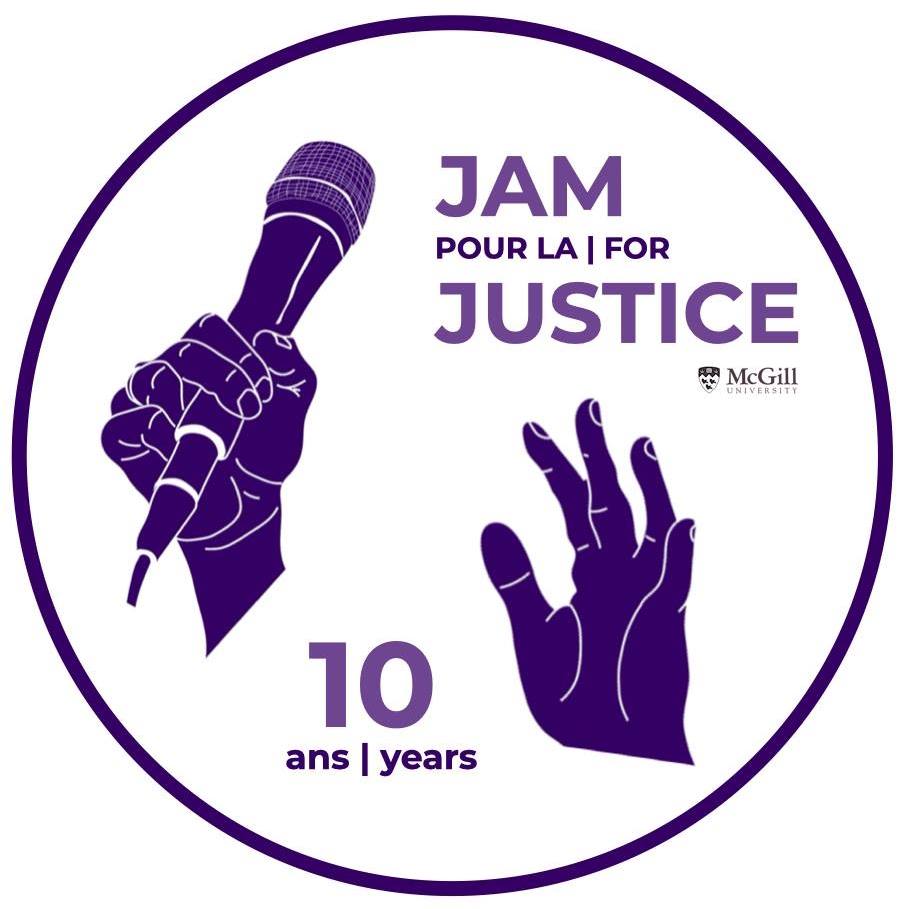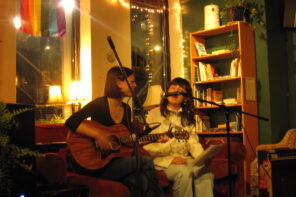This year has been one of the toughest for McGill’s music scene. Both local artists and student-run organizations have been grappling with working and performing online, and they are finding new and creative ways to stay engaged and connected with the McGill community.
For Montreal-based artists like Katie Harbour, the entire experience of creating and performing music has shifted since the pandemic. Before, she regularly performed at local bars, weddings, and other local venues where she could “get a better gauge on what gets people’s attention or try originals and see the response.” However, when the pandemic necessitated a switch to online performances, Katie had to shift her creative process. Before, she was “so used to being with others and collaborating,” but found that the pandemic and its resulting isolation “pushed [her] to be creative by [herself].”
the move to online performances…has made her music much more accessible and provided another positive opportunity for local musicians
In a technical sense, Katie has learned to record herself at home with a new audio interface on her laptop that she wouldn’t have discovered had she kept recording in studios. She’s also been able to find beats online, edit her own vocals, and even set up a potential collaboration for an EP. Although she finds herself struggling to write sometimes when there’s so little going on, it has been both fun and freeing to experiment with new sounds and produce something different that may not have happened otherwise. In another sense, the move to online performances through Instagram Live sessions with student-run organizations like McGill’s Jam for Justice and Heart4Heart has made her music much more accessible and provided another positive opportunity for local musicians.
Throughout the fall semester, Jam for Justice has been the host to a series of Instagram Live performances that feature student artists in an attempt to bring back the feeling of community and joy shared through live music that so many of us miss. Natan Aber-Krusner and Dylan Rochon Terry, two leading members of the organization lament that the pandemic has been “especially hard for artists [who are] struggling to create the authentic connection and vibe online.” To combat this, Jam for Justice organized Insta-Jams, made up of twenty to thirty-minute sets from their homes that managed to capture some sense of the “live” aspect of music performances. At the start of the year, they also had ideas to host socially distanced concerts in the park or even on a rooftop, but the red zone restrictions forced them to cancel. On the other hand, Natan describes how the Insta-Jams have made their events and performances have a more “lasting effect on their online presence” and enabled them to promote Montreal-based artists without a platform. Despite all the difficulties of this transition online, McGill’s music organizations like Jam for Justice have adjusted and shifted their focus to expanding and improving their platforms in ways that aim to make the return to normal all the more enriching.
Together, they rebuilt the chapter, going from about three audience members right before COVID-19, to having fully packed events.
The McGill Jam for Justice chapter, one of the organization’s largest, has existed for over ten years; it is led now by Zoey Richards, a U3 Arts student, who has been co-president for the past three years, and Dylan Rochon Terry. Richards joined in her first year at McGill as a general member, but when other members of the club had graduated, she and Rochon Terry were left to figure out how to run the club. With no contacts, no members, and no experience running clubs, they relied heavily on the parent organization for support. Together, they rebuilt the chapter, going from about three audience members right before COVID-19, to now having fully packed events online.
Richards explained that the primary goal of the Jam for Justice organization is to “facilitate sharing music and giving back to the Montreal music community,” especially through the parent organization’s “Jam Kits” initiative. This program provides musical instruments, music books, and other musical resources for those in the community who are otherwise unable to access them. The Montreal branch of the Jam for Justice organization, including the McGill chapter, has worked very closely with the School of Music Montreal (SoMM), which aims for education equality by providing accessible and supportive musical education to underprivileged schools.
One of the main programs of Jam for Justice is Concerts for Comfort, an initiative where musicians perform at hospitals and senior residences. At the McGill chapter, there’s a team of executives who work on reaching out to local senior homes to see if they want music that would connect them to the Montreal community. From regulars at Jam for Justice events to McGill Acapella groups, this initiative provides the opportunity for musicians to practice performing and for their audience to hear new music while interacting with the McGill community.
Before COVID-19, McGill’s Jam for Justice hosted a lot of in-person coffee houses, where they encouraged McGill students to start experimenting with their music. Richards explains how these events focused on creating open spaces for musicians and were pay-what-you-can. They also hosted larger events, including some unconventional concerts in people’s apartments, which included many local bands like Montreal’s Societal Siege.
Antoine Guimbal, a U3 theatre student and a member of Societal Siege, described how there are a variety of “cool independent venues” in Montreal that bands can approach on their own, without any formal experience, and that this is “an opportunity that’s unique to Montreal.”
Societal Siege became involved with Jam for Justice about a year ago. The collaboration began when Jam for Justice reached out and suggested that the band play a show inside of a house, which the club had never done before. “What’s cool about Jam for Justice,” explained Guimbal, “is that they have so many different types of concerts and opportunities to show off your music; there’s a variety and diversity of performance modes that they offer.”
Richards declares that Jam for Justice wants to “facilitate a music conversation” with the McGill and broader Montreal communities.
When asked about how the group has functioned and transitioned since the COVID-19 pandemic, Richards said that Jam for Justice has tried to “use [their] platform as a way of letting people know about Montreal-based non-profits that they can donate to,” due to the difficult financial situations that these groups may be in. They decided to spotlight organizations that would be important if their audience should have the funds to donate.
Nevertheless, Jam for Justice has given them the opportunity to express themselves and perform again during difficult times.
However, COVID-19 has proven to be a bit complicated for bands like Societal Siege, who have been forced to adapt to having one member of their band on the other side of Canada. Guimbal and Jacob Barten, a U3 music education major, explain that sending audio files back-and-forth across the country has been rather tedious for their band. Nevertheless, Jam for Justice has given them the opportunity to express themselves and perform again during difficult times.
During the pandemic, Societal Siege has performed as part of Jam for Justice’s series of live streams. The band focused on Meals for Milton-Parc during their performances because of the current consequences that the pandemic has inflicted on the neighbourhood’s unhoused community. They explained how allowing each artist to choose an organization to highlight gives them the “flexibility to use that platform to amplify [an important cause] by choosing something that they’re passionate about.”
One of the new projects that McGill’s Jam for Justice chapter has developed during the COVID-19 pandemic is a podcast, Music to Life (MTL), which interviews people in the McGill/Montreal community about how they interact with music. The podcast will interview producers, musicians, and other members of the local music scene. They have also been creating playlists every couple of weeks with Montreal artists and performances on Instagram Live, hoping to “keep the conversation about music going.”
“It’s been really fun,” Richards said about Jam for Justice’s new initiatives. “You can even say that [it has been] a highlight of the pandemic.








